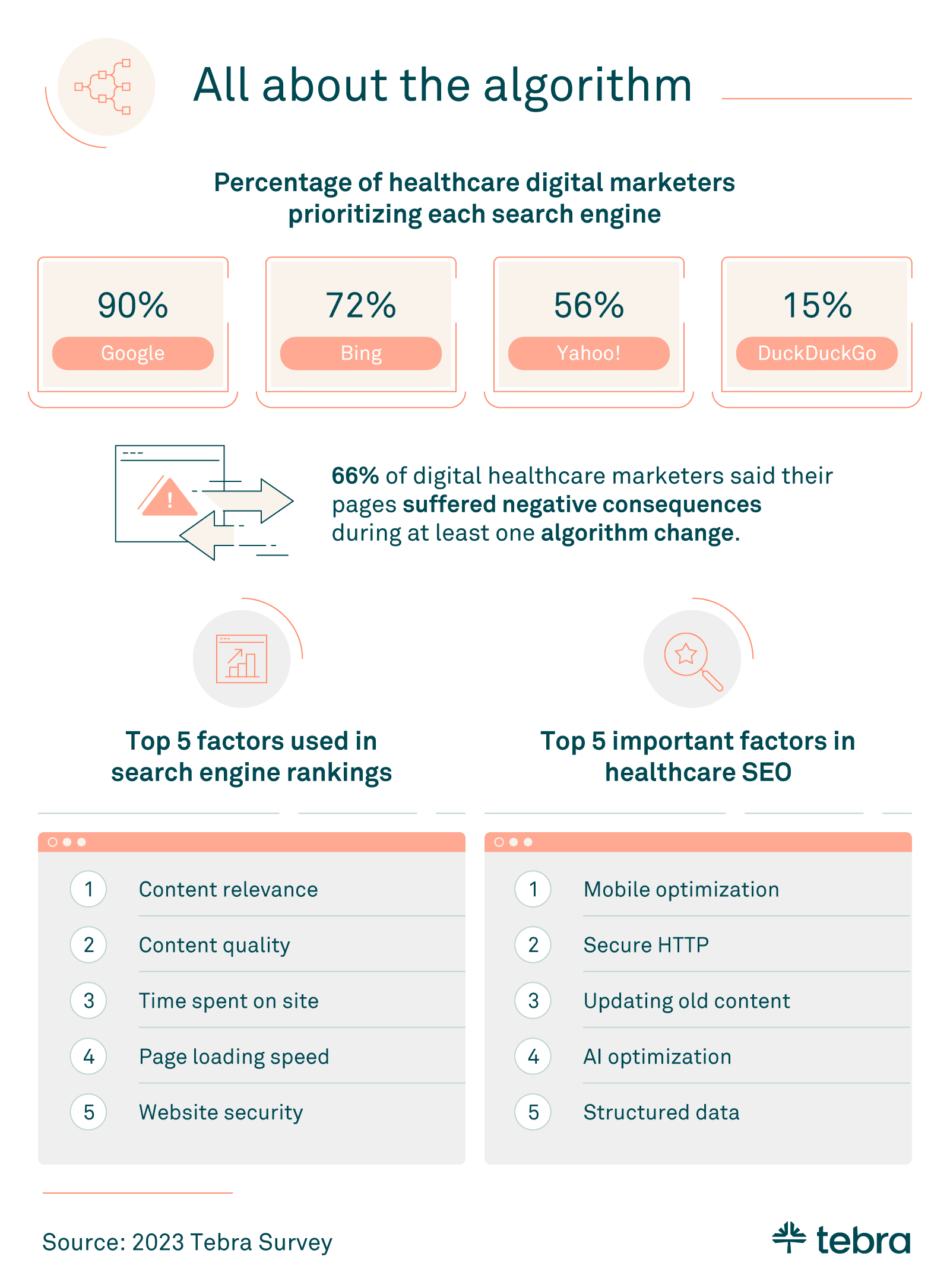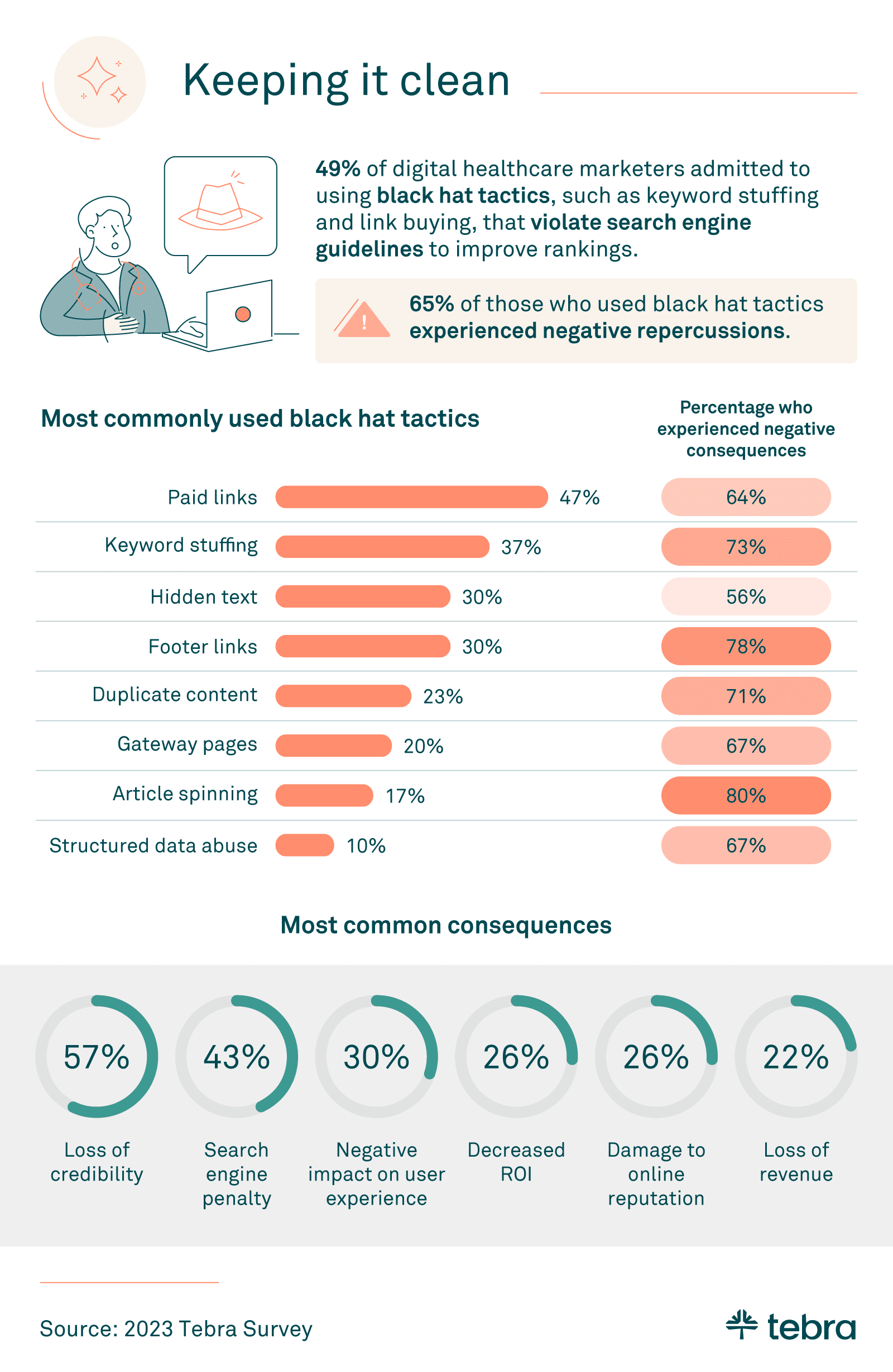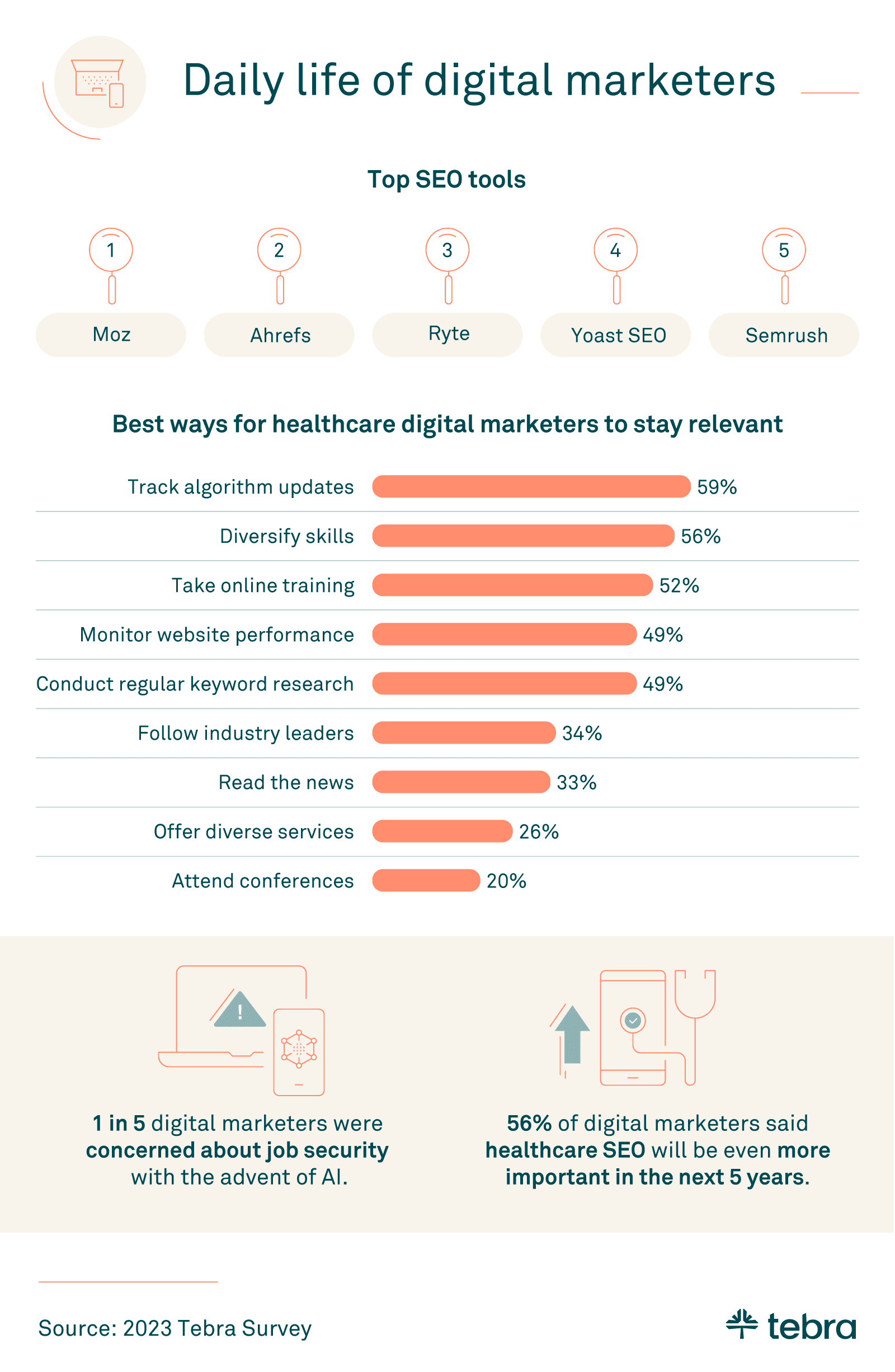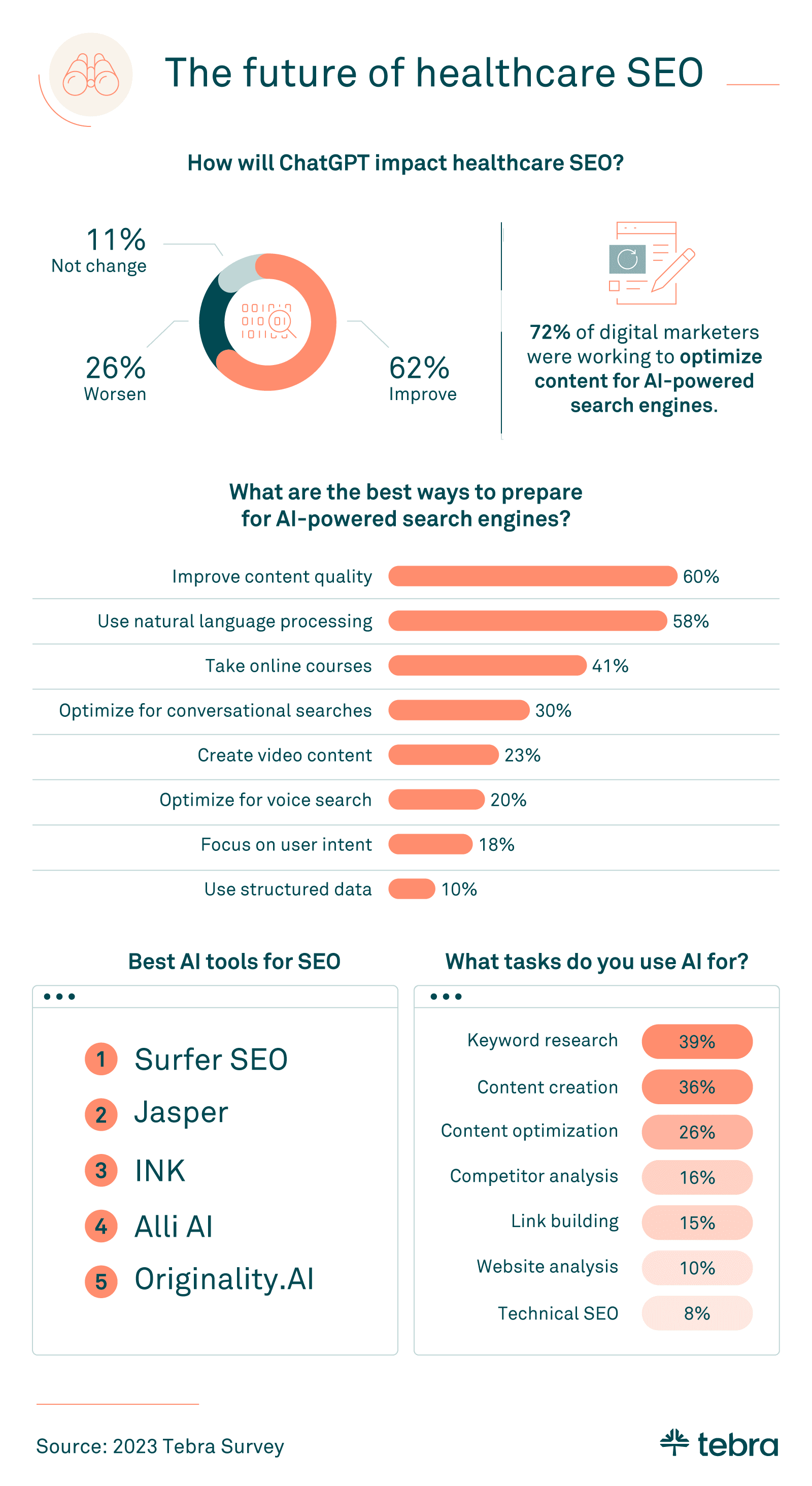
- Search visibility for healthcare practices depends on mobile optimization, page speed, and secure websites, as patients expect seamless digital experiences.
- AI, large language models (LLMs), and Generative Engine Optimization (GEO) are reshaping how patients find providers, requiring content that’s conversational, structured, and trustworthy.
- Local SEO and reviews remain critical, as most patients search “near me” before booking an appointment.
- Continuous investment in content quality, structured data, and ethical SEO practices ensures long-term competitiveness, even as algorithms evolve.
Healthcare SEO is evolving quickly, with AI, mobile-first experiences, and local search reshaping how patients find providers online. Success depends on ethical practices, continuous adaptation to algorithm changes, and building trustworthy content that both search engines and patients value.
It seems that online search engines have become the gateway to modern healthcare. The internet is how most new patients find their physicians, look up healthcare information, and do background checks on healthcare professionals.
Healthcare SEO, part of overall search engine optimization, involves improving healthcare website rankings to increase organic traffic. Search engine rankings can make a big difference for your practice. When people search for online services, 81% of the clicks go to the first 5 organic websites listed. Being part of that top 5 will drive a huge amount of traffic to your website and to your practice.
The shifting terrain of healthcare SEO trends
Search engine optimization (SEO) has become increasingly important in the ever-competitive digital marketing landscape. Trends are continually evolving as new technologies become readily available and old practices become obsolete. Staying up to date with the latest SEO practices in healthcare is essential. It helps providers and organizations attract new patients while engaging and retaining existing ones.
To discover how shifts in SEO impact modern healthcare, Tebra surveyed over 200 digital marketers working in the industry. Here are the current trends, expert predictions, and growing concerns driving the field for 2025.
Keeping up with algorithms
The methods by which healthcare marketers get their message out depend greatly on search engine algorithms. But these algorithms change regularly, as do other key determinants that propel health websites up the search engine rankings. Which search engines are marketers prioritizing, and what best practices shape their work?

According to our survey results, Google continues to reign supreme. We found a staggering 90% of digital marketers prioritizing their optimization efforts for this search engine giant. Bing and Yahoo! followed at 72% and 56%, respectively, while privacy-focused DuckDuckGo only captured 15% of marketers’ attention.
Healthcare marketers also shared the factors that drive how these search engines rank healthcare websites. According to our respondents, the top 5 factors used in search engine rankings are:
- Content relevance. If you’re looking for a same-day eye exam and wind up on a blog post about Lasik, something’s off. And, chances are, you’re not going to trust the medical office who misdirected you. To stay relevant and interesting to clients, healthcare organizations should closely follow keyword suggestions for their digital content.
- Content quality. Potential patients are looking for providers they can trust. And your digital presence is a reflection of your physical practice. Factual or grammatical errors in your content won’t inspire trust in the quality of your services.
- Time spent on site. The seconds or minutes consumers spend on your website are valuable. With improved healthcare analytics, you can see where people enter your site and where they go from there. You can help make your site sticky and build your practice by including buttons with every blog post that allow people to schedule appointments.
- Page loading speed. This can make or break an inquiry. It’s best to aim for a half-second loading speed, with 2 seconds as the maximum. If it takes 3 seconds or more to load, you’ve likely lost a lead and they’ll find a different website. Check out Google’s tool on PageSpeed Insights for help with this.
- Website security. Google penalizes websites that don’t use SSL security. With sensitive patient information being typed into your website, it's crucial that you keep your visitors’ data and your data safe. Prioritizing this improves your SEO rankings and protects medical records and other sensitive data.
So, what are the hottest trends in healthcare SEO? Here are the top 5.
- Mobile optimization
- Secure HTTP
- Updating old content
- AI optimization
- Structured data
It's hard to stay ahead of search engine algorithms. Despite their best efforts, 66% of healthcare marketers have experienced negative consequences on their pages during at least one algorithm change. This highlights the importance of understanding algorithm updates and the difficulty of constantly adjusting strategies to maintain search visibility.
Optimizing healthcare websites
SEO is fundamental, but it has limitations. It’s only the first step for your practice — the next is having a coherent and helpful website. Having a high search engine ranking introduces leads to your practice, but you also need to convert them into patients. Let’s take a look at how.
Ethical website practices
In healthcare, integrity and ethical practices are crucial in gaining and maintaining patient trust. However, some marketers try to boost search engine rankings using black hat tactics — practices that violate search engine regulations. How often does this happen, and how does it impact the healthcare market?

Unfortunately, nearly half of the digital marketers surveyed (49%) admitted to using black hat tactics. About a third of them did not experience negative consequences from doing so. However, many others faced repercussions like loss of credibility (57%) and search engine penalties (43%).
Other consequences included negative impacts on user experience (30%), decreased ROI (26%), online reputation damage (26%), and revenue loss (22%). Paid links (47%) were the most common black hat tactic. However, marketers experienced more negative consequences as a result of article spinning, footer links, and keyword stuffing.
Importance of mobile optimization in healthcare SEO
Most people these days are searching for answers on their mobile phones. If people have difficulty reading or navigating a web page from their phone, they’ll often leave and find another source. Being mobile-friendly is a must.
Mobile optimization is key to offering the best user experience possible and improving your search ranking. With the increase in local searches, you need to offer a seamless website no matter the device. A responsive website design allows the content to look just as good on a smartphone as on a laptop.
SEO strategies for healthcare: Content and AI
One of the biggest strategies for generating organic traffic is the use of targeted SEO content. Content marketing is more than just jumping through digital hoops, though. It’s an opportunity to improve patient education through writing about healthcare services, health plans, and other relevant topics. Then your valuable content needs to be optimized and promoted to drive traffic through healthcare SEO.
Healthcare blog
Your practice’s website should cover who you are, what you do, and how you compare in the healthcare landscape. It can provide contact information, hours, and ways to schedule appointments and pay bills. But the most straightforward way to bring new visitors to your site is to include a blog filled with relevant content. Interesting content can bring people to the site, and then into a doctor’s office.
Common blog topics include:
- Personalized medical care
- Healthcare trends
- Online health services
- New healthcare technology
Choose sub-topics that are relevant to your practice so that potential clients searching for information about their health concerns will be drawn to your site. Including brief versions of these blog posts, with links, in email newsletters is a great way to keep current patients invested in your services between visits.
Health websites need to be careful and stay up to date with the most recent research in their fields. Whatever they write and publish as free content must be accurate and trustworthy, and keep readers safe. Readers looking for a better healthcare experience will appreciate the authority and trustworthiness you project in your blog posts.
The rise of AI
Rather than resorting to unethical tactics, healthcare marketers can succeed by leveraging new technologies. For example, emerging AI technology could reshape the digital marketing model as well as the healthcare marketplace as a whole.

Many marketers recognize the growing importance of leveraging AI technologies to stay competitive in the digital landscape. Over 60% said the AI chatbot ChatGPT would improve healthcare SEO. Meanwhile, 26% said it would worsen it, and 11% said it would not change. And 72% of respondents were already optimizing content for AI-powered search engines.
Marketers most often used AI for keyword research (39%) and content creation (36%). They also used it for content optimization (26%), competitor analysis (16%), link building (15%), website analysis (10%), and technical SEO (8%). Marketers recommended Surfer SEO, Jasper, INK, Alli AI, and Originality.AI as the best AI tools for SEO.
“In preparation for the rise of AI, digital marketers are employing various strategies.”
In preparation for the rise of AI, digital marketers are employing various strategies. The most common strategies used by respondents were improving content quality (60%) and using natural language models (58%). Further, over 40% said online courses helped them gain essential skills, indicating a dedication to continuous learning and professional development.
Additionally, marketers identified optimizing for conversational searches (30%), creating video content (23%), and focusing on voice search (20%) as tactics. By prioritizing user intent (18%) and implementing structured data (10%), marketers ensure their content aligns with user expectations and algorithms.
Healthcare SEO strategies
Clinics can give themselves a fighting chance in their market by improving healthcare website rankings. So what are some useful tactics for optimizing medical SEO?
Local SEO for healthcare
Local SEO, also called local search, is when people search with location-based features. Think of the “near me” feature and GPS apps like Google Maps that show both locations and reviews for businesses.
This is becoming increasingly important in keeping medical businesses highly ranked. One of the first steps in optimizing your website is to update your business name, address, and phone number on these sites. Make sure to be consistent across all listservs, websites, and social media.
The next step is to harness the power of online reviews. Asking your patients for surveys and encouraging them to leave reviews is very useful. The more reviews you have, the more trustworthy your rating seems. And, in the case of negative reviews, always respond promptly and politely, without disclosing any patient information. Seeing your office handle negative feedback gracefully shows that there is mutual respect between providers and patients.
On-site SEO
On-site SEO is the overall optimization of both content and HTML source coding of a website. The goal is to make everything on a site easy for readers to comprehend and easy for search engines to find, assess, and rank highly in search results. There are many techniques involved in on-site SEO; let’s look at a few common ones.
- First, thoroughly audit the web page’s HTML code to make sure it is flagged as relevant for different search queries.
- Use internal links to keep readers on your site, lead them to conversion points, and guide web crawlers to your content.
- Make your site friendly for mobile devices.
- Keep your written web content up-to-date with relevant keywords. Edit and rewrite them when necessary.
- Give articles a clear, clean structure; use keywords in headlines, subheads and metadata; and use photos to make points and maintain reader interest.
Staying relevant with medical SEO
Changing algorithms, unethical tactics, new technology — many factors are causing shifts in digital marketing and healthcare SEO trends. How are marketers staying relevant so they can continue to succeed in 2025?

According to our survey, tracking algorithm updates was the top priority among 59% of healthcare digital marketers. It was followed closely by diversifying skills (56%) and online training (52%). Monitoring website performance (49%) and conducting regular keyword research (49%) were other key strategies.
To complete crucial SEO tasks, respondents named Moz the best optimization tool, followed by Ahrefs, Ryte, Yoast SEO, and Semrush. Even as they use AI tools and technology, 1 in 5 marketers were concerned about job stability because of AI. However, 56% said SEO would be more important in healthcare in the next 5 years.
Embracing change
Like other industries, the landscape of SEO and digital marketing in healthcare is experiencing significant changes due to technological advancements. Continuous learning and adaptability can position SEO professionals for success. By leveraging the insights and trends discovered in this article, healthcare providers and organizations can strive to expand their reach.
Methodology
Tebra surveyed 207 digital healthcare marketers who work in SEO to explore trends, tools, and practices.
About Tebra
Tebra provides independent healthcare practices with digital tools and support to thrive in the new era of healthcare. Tebra’s platform helps practices attract new patients, deliver modern care, operate efficiently, and get paid quickly.
Fair use statement
If you found this article on healthcare SEO trends insightful, please feel free to share it for noncommercial purposes only. You must provide a link back to this page so readers can access our full findings and methodology.
FAQs
Frequently asked questions
You might also be interested in
77% of patients read reviews before choosing a doctor. Learn how your practice can boost its online reputation in the 2025 Patient Perspectives report.
- Current Version – Oct 26, 2025Written by: Jean LeeChanges: This article was updated to include the most relevant and up-to-date information available.





